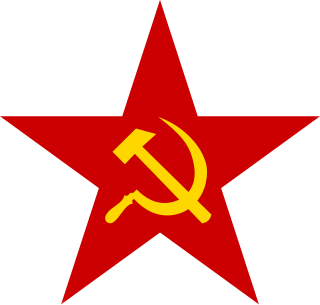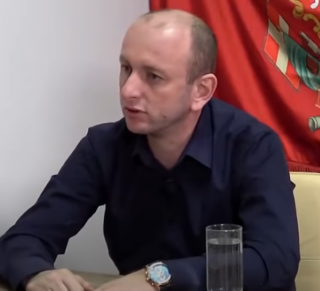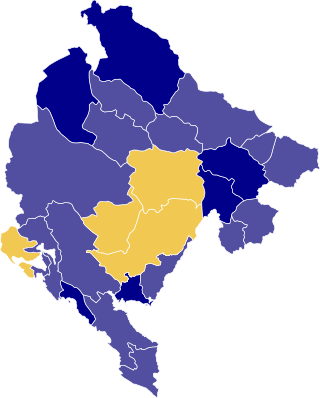The Democratic Party of Socialists of Montenegro is a populist political party in Montenegro. A former long-time ruling party sitting at the opposition for the first time as of 2020, it was formed on 22 June 1991 as the successor of the League of Communists of Montenegro, which had governed Montenegro within the Socialist Federal Republic of Yugoslavia since World War II, and has remained a major force in the country ever since. The party is a member of the Socialist International and the Progressive Alliance, and an associate of the Party of European Socialists. During the 1990s, DPS was the major centre-left, social-democratic party in favour of Serbian-Montenegrin unionism. However, since 1997, the party has embraced Montenegrin independence and has been improving ties with the West, slowly turning into a catch-all party embracing Atlanticism, Montenegrin nationalism, neoliberalism, and pro-Europeanism.
The Civic Party of Montenegro was a minor liberal political party in Montenegro.

The Democratic League in Montenegro is an Albanian minority political party in Montenegro.

The Montenegrin Federalist Party, sometimes known simply as the Montenegrin Party, was a Montenegrin political party in the Kingdom of Yugoslavia which stood for preservation of Montenegrin autonomy and a decentralized federalised Yugoslavia. It pursued the ideology of the Greens who lost the Christmas Uprising, but in a peaceful and democratic manner. Its best known leader was Sekula Drljević.

Andrija Mandić is a Montenegrin politician serving as a member of the Parliament of Montenegro since 2020 and the president of the right-wing New Serb Democracy. He was the head of the Democratic Front parliamentary club in the parliament until 2020.
The Czech Pirate Party or Pirates is a liberal progressive political party in the Czech Republic, founded in 2009. The party was founded as a student-driven grassroots movement campaigning for political transparency, civil rights and direct democracy.
The Pirate Movement is an unregistered political party in Serbia. It strived to ban copyright based systems, reform intellectual property law, protect freedom of speech, preserve and promote net neutrality and privacy, introduce liquid democracy in Serbia and defend personal privacy as basis for the sovereignty of the citizen. On January 22, 2022, the party was accepted as an observer member of the European Pirate Party.
Dnevne novine is a Montenegrin daily newspaper. Its first editor and owner is Boris Darmanović, owner of Media Nea, a Montenegrin media agency.

Yugoslav Communist Party of Montenegro is a minor communist political party in Montenegro. The party mostly gathers pensioners, mainly with Titoistic and nostalgic feelings towards life in the former Communist Yugoslavia (SFRJ).

The Democratic Front was a right-wing populist and socially conservative political alliance in Montenegro. It was composed of the New Serb Democracy, Movement for Changes and Democratic People's Party, with some other minor parties as the alliance's partners at the local level, while United Montenegro and Workers' Party were external members of the Democratic Front parliamentary group. The alliance was formed mainly to overthrow the Democratic Party of Socialists, the party in power from the introduction of the multi-party system until the 2020 parliamentary election.

The Democratic People's Party is a populist and social conservative political party in Montenegro.

A coup d'état in the capital of Montenegro, Podgorica was allegedly planned and prepared for 16 October 2016, the day of the parliamentary election, according to Montenegro's special prosecutor. In September 2017, the trial of those indicted in connection with the plot began in the High Court in Podgorica, the indictees including leaders of the Montenegrin opposition and two alleged Russian intelligence agents. Russian government officials denied any involvement. In 2019, the Higher Court found the accused guilty of plotting to commit ″terrorist acts″, also of "undermine the constitutional order of Montenegro" and first instance sentenced 13 people. In February 2021, the appellate court annulled the first instance verdict on all counts of the indictment.

Milan Knežević is a Montenegrin politician and poet who is the founder and current president of the right-wing Democratic People's Party, a member of presidency of the opposition Democratic Front alliance and current Мember of the Parliament of Montenegro as well as the President of the Parliamentary Board for Defence and Security.

In late December 2019, a wave of protests started against the controversial, newly adopted "Law on Freedom of Religion or Belief and the Legal Status of Religious Communities" which effectively transferred ownership of church buildings and estates built before 1918 from the Serbian Orthodox Church in Montenegro to the Montenegrin state. The Serbian Orthodox Church in Montenegro, which owned 66 mainly medieval monasteries, dozens of churches and other real estate there, insisted the state wanted to impound its assets, while Pro-Western Montenegro's president Milo Đukanović, accused the Serbian church of promoting pro-Serb policies that are aimed at "undermining Montenegrin statehood".

The COVID-19 pandemic in Montenegro has resulted in 251,133 confirmed cases of COVID-19 and 2,654 deaths.
Anti-Montenegrin sentiment is a generally negative view of Montenegrins as an ethnic group, commonly involving denial of the Montenegrin ethnicity and language, and negative feelings towards Montenegro. It is present in right-wing discourse in Montenegro and the ex-Yugoslavia region, mainly Serbia, and dates back to the 19th and 20th century.

Presidential elections were held in Montenegro on 19 March 2023. Long-ruling incumbent president Milo Đukanović was eligible for re-election. Since no candidate received a majority of the vote, a second round vote was held on 2 April. In the first round, Đukanović, leader of the populist DPS, received 35%, coming first. Jakov Milatović, candidate of the newly formed centrist Europe Now! movement, running on an anti-corruption platform, outperformed the polls, gaining 29% of the votes and faced Đukanović in the second round. Andrija Mandić, one of the leaders of the right-wing populist DF secured 19% of the votes, finishing third in the first round. The second round runoff resulted in Milatović defeating Milo Đukanović in a landslide, becoming the first elected president not being a member of the Đukanović's DPS since introduction of the multi-party system in 1990, winning roughly 60% of the popular vote. It was the first time a runoff vote was held since the 1997 election, making it first presidential runoff since Montenegro gained independence in 2006, also the first election since 1997 where an incumbent president actively seeking reelection was denied a second term.













